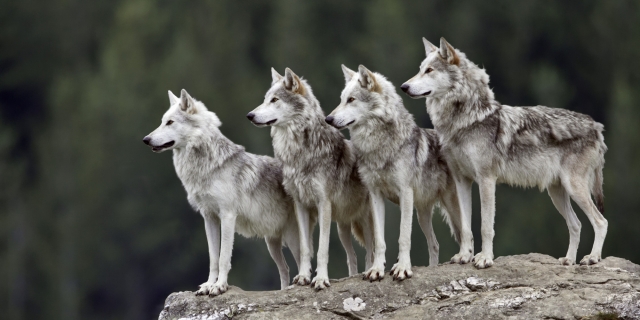Province accused of working with forest industry on mountain caribou recovery plan
As the province’s wolf cull gets set to enter its second season, environmentalists are accusing the provincial government of letting logging companies affect mountain caribou management policies.
The province launched into the wolf cull last winter, claiming it was necessary to protect the dwindling South Selkirk and South Peace caribou herds.
Locally, the South Selkirk herd was down to just 18 members at the time – from 47 in 2009. The herd now sits at just 14 members.
The wolf cull aimed to take out about 200 wolves province-wide last winter to protect the two herds, but sharpshooters in helicopters shot just 84 due to the low snowpack. So the cull is set to continue this winter.
Those opposed to the hunt, which include many B.C. environmental groups and nearly 160,000 people from around the world who signed a petition to stop the cull last year, say the wolf cull is just a scapegoat to cover up the real causes of caribou decline: habitat destruction and disturbances by snowmobiles.
And the Wilderness Committee’s Gwen Barlee added some fuel to the latter argument recently, when she revealed the results of a freedom of information (FOI) request that appear to show the province let logging companies influence its plans to protect the caribou.
Speaking to host, Rebecca Zandbergen on CBC Radio’s Radio West program, Barlee said the FOI documents were full of “red flags” about the caribou protection consultations.
“What it shows was that the B.C. government was working hand in hand with the logging industry in writing and drafting and creating recovery strategies for species at risk in this province,” Barlee said.
“It appeared that the province was trying to avoid putting further restrictions on logging, so instead, they went ahead with an unproven, untested, unethical wolf kill.”
According to the CBC, the documents to which Barlee points include a briefing note prepared for Minister of Environment, Mary Polak’s meeting with logging company, Tolko Industries in April 2014.
The documents says the company was “concerned” about the province’s Mountain Caribou Recovery Implementation Plan (MCRIP), which includes a proposal to protect caribou habitat from human activities – and suggests industry stakeholders were unhappy a wolf cull had not been tried yet.
“Industry has criticized government for failing to effectively implement this recovery action, and will be very reluctant to forego additional harvesting opportunities to meet any additional habitat targets imposed by the federal recovery strategy,” the document reads.
The Nelson Daily contacted the Ministry of Forests, Range and Natural Resources for comment and received an email with an audio file of Minister Polak being interviewed on Oct. 26 by reporters in Victoria on the issue.
Polak said the FOI request also contained similar briefing notes from meetings she had with environmental groups at the same time.
“So I met with a number of stakeholders including industry,” she noted.
She added that the province has protected 2.2 million hectares of caribou habitat, closed a million hectares of land to snowmobiling and recreation tenure opportunities to the tune of a million hectares since the MCRIP was put in place in 2007.
“So really, moving to a cull of wolves was a result of an emergency situation with a rapidly declining herd,” she explained. “It’s not province wide. It’s targeted, and it has the support of the local environmental organization, Wildsight.”
The West Kootenay EcoSociety has supported the cull along with Wildsight, with both saying it’s a necessary emergency measure to save the South Selkirk herd from imminent collapse.
The Valhalla Wilderness Watch has vehemently opposed the cull, calling it a “huge cover up” for a failure by the province to properly protect caribou habitat from logging and snowmobile use.

























